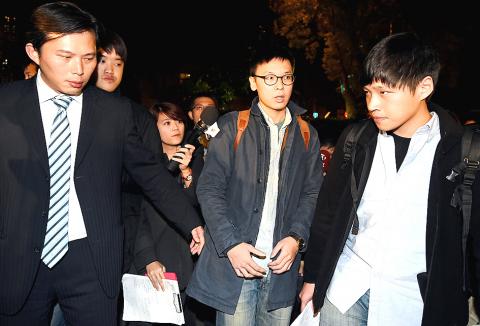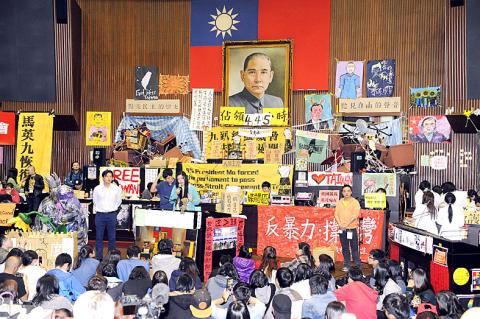Prosecutors yesterday filed charges against 119 people — including leading figures Lin Fei-fan (林飛帆), Chen Wei-ting (陳為廷), Dennis Wei (魏揚) and Huang Kuo-chang (黃國昌) — for their roles in the student-led Sunflower movement that occupied the main legislative chamber last year and subsequent rallies opposing what the protesters called the Chinese Nationalist Party (KMT) government’s opaque handling of a trade-in-services pact with China.
Lin, Chen and Huang were among 22 indicted for breaking into the Legislative Yuan on March 18 last year, which led to an occupation lasting almost 23 days by hundreds of protesters. Wei, who led another group of protesters in an offshoot siege of the Executive Yuan across the road on March 23 last year, was one of 93 people indicted over that incident. Charges were also brought against Hung Chung-yen (洪崇晏) and two others, who on April 11 last year took to the Web to mobilize a large crowd to surround the Zhongzheng First Police Precinct near the legislature, the precinct responsible for maintaining order during the protests.
At least two foreigners were also among the 119 indicted — US political activist and long-term resident Lynn Miles, who is also known by his Chinese name Mei Hsin-yi (梅心怡), and Canadian photojournalist David Smith.

Photo: Chu Pei-hsiung, Taipei Times
According to the indictment, the charges against the 119 included instigating others to commit a crime, trespassing, illegal entry into a building, obstructing an officer from discharge of duties, insulting a public official or office and violating the Assembly and Parade Act (集會遊行法).
In response to the indictment, Huang wrote a Facebook post yesterday, rejecting the grounds on which many students were indicted.
“I did not incite any criminal activities, and I ask the public to bravely resist the Ma administration’s abuse of authority and stand up to save Taiwan’s democracy, which is on the verge of falling off a cliff,” he said.

Photo: Chen Chih-chu, Taipei Times
Chen said the government had perverted the judicial system, adding: “There are 119 people being charged, but what about the police officers who used violence against civilians and [then-premier] Jiang Yi-huah (江宜樺), who ordered the crackdown against protesters? None of them have been charged. The judiciary is biased. It only persecutes civilians and does not go after government officials.”
“We were fighting against the signing of the service trade agreement with China. It was a civil resistance action against the government; the people who participated are not guilty of any crime,” Wei said.
Wei’s mother, Yang Tsui (楊翠), a prominent Taiwanese literature academic, said she suspected the prosecutors’ move was made under duress.
Yang backed Wei and his fellow activists, saying: “Civil disobedience is necessary and legitimate, and what the students admitted doing were not wrongdoings, but necessary actions.”
The indictments come as no surprise to those familiar with the KMT’s political maneuvers, she said, adding that the indicted students would not evade their legal responsibility and that she was thankful for lawyers who volunteered to help.
“There would have been no protests if politics was clean. The students stood up to the government precisely because it is not,” she said.
Student activist Lai Pin-yu (賴品妤), a member of the Black Island National Youth Front, said that participants in the occupation of the legislature’s main chamber knew from the start that they would be required to take legal responsibility for their actions.
However, she also asked if police officers who cleared the protesters should face charges for their actions, and accused President Ma Ying-jeou’s (馬英九) administration of being lenient on police brutality.
Meanwhile, Democratic Progressive Party (DPP) spokesperson Cheng Yun-peng (鄭運鵬) acknowledged the protesters’ actions, which he said were carried out in the name of the nation’s democracy and should not be considered criminal.
The DPP called for the judiciary to regard the incident from a historical perspective and refrain from damaging democracy.
Executive Yuan spokesperson Sun Lih-chyun (孫立群) said the Executive Yuan hoped that those charged would be treated with “a tolerant attitude,” but said the charges should not be dropped.
Additional reporting by Hua Meng-ching, Chen Hui-ping, Lii Wen, Alison Hsiao and CNA

SECURITY: As China is ‘reshaping’ Hong Kong’s population, Taiwan must raise the eligibility threshold for applications from Hong Kongers, Chiu Chui-cheng said When Hong Kong and Macau citizens apply for residency in Taiwan, it would be under a new category that includes a “national security observation period,” Mainland Affairs Council (MAC) Minister Chiu Chui-cheng (邱垂正) said yesterday. President William Lai (賴清德) on March 13 announced 17 strategies to counter China’s aggression toward Taiwan, including incorporating national security considerations into the review process for residency applications from Hong Kong and Macau citizens. The situation in Hong Kong is constantly changing, Chiu said to media yesterday on the sidelines of the Taipei Technology Run hosted by the Taipei Neihu Technology Park Development Association. With

CARROT AND STICK: While unrelenting in its military threats, China attracted nearly 40,000 Taiwanese to over 400 business events last year Nearly 40,000 Taiwanese last year joined industry events in China, such as conferences and trade fairs, supported by the Chinese government, a study showed yesterday, as Beijing ramps up a charm offensive toward Taipei alongside military pressure. China has long taken a carrot-and-stick approach to Taiwan, threatening it with the prospect of military action while reaching out to those it believes are amenable to Beijing’s point of view. Taiwanese security officials are wary of what they see as Beijing’s influence campaigns to sway public opinion after Taipei and Beijing gradually resumed travel links halted by the COVID-19 pandemic, but the scale of

A US Marine Corps regiment equipped with Naval Strike Missiles (NSM) is set to participate in the upcoming Balikatan 25 exercise in the Luzon Strait, marking the system’s first-ever deployment in the Philippines. US and Philippine officials have separately confirmed that the Navy Marine Expeditionary Ship Interdiction System (NMESIS) — the mobile launch platform for the Naval Strike Missile — would take part in the joint exercise. The missiles are being deployed to “a strategic first island chain chokepoint” in the waters between Taiwan proper and the Philippines, US-based Naval News reported. “The Luzon Strait and Bashi Channel represent a critical access

Pope Francis is be laid to rest on Saturday after lying in state for three days in St Peter’s Basilica, where the faithful are expected to flock to pay their respects to history’s first Latin American pontiff. The cardinals met yesterday in the Vatican’s synod hall to chart the next steps before a conclave begins to choose Francis’ successor, as condolences poured in from around the world. According to current norms, the conclave must begin between May 5 and 10. The cardinals set the funeral for Saturday at 10am in St Peter’s Square, to be celebrated by the dean of the College